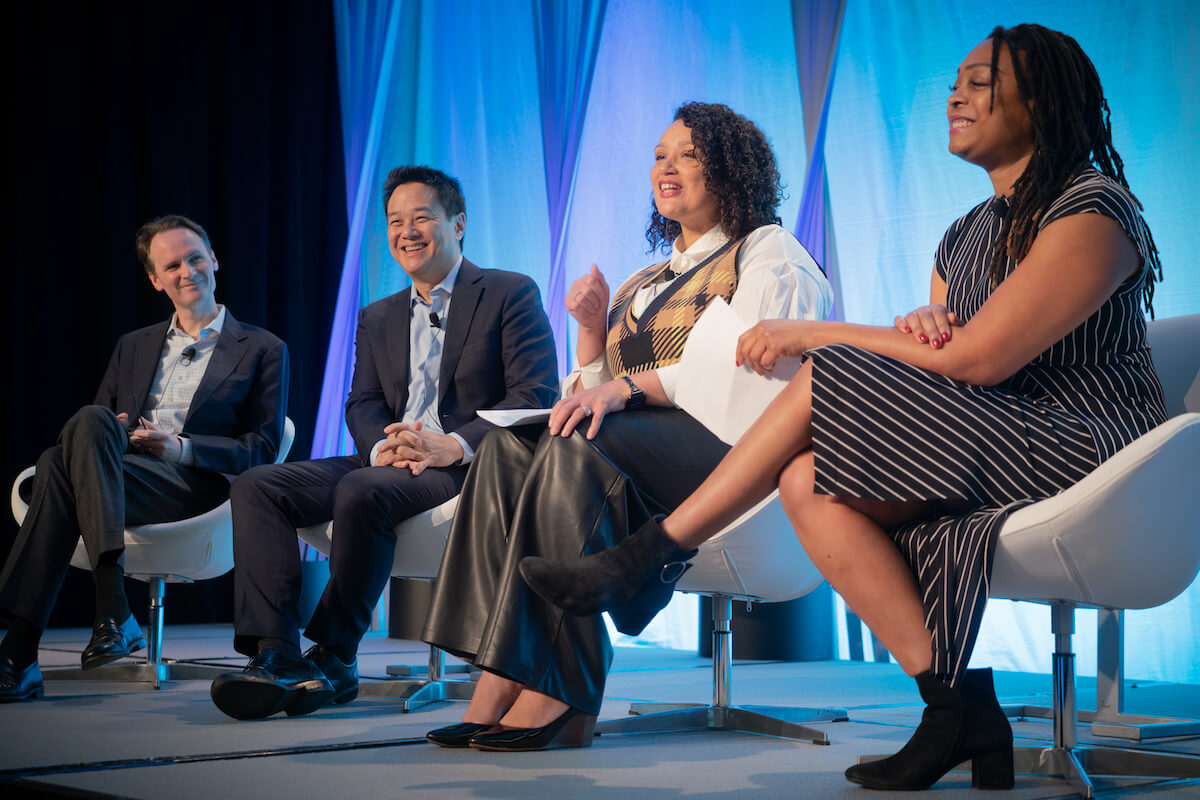Greetings, Agents of Impacts. Here’s an elbow bump from across the social distance. Like many of you, we spent the weekend hunkering down and getting oriented to the new virtual reality. It seems the coronavirus pandemic could bring out either the worst or the best in us. The clear intent of the growing community of Agents of Impact: Let’s make it the latter.
Two themes are emerging from your incoming contributions. First, resiliency has tangible value. Investments made in knitting together ecosystems and networks of trust help communities, companies and portfolios weather the inevitable surprises of pandemic, recession or climate change. As Cornerstone Capital’s Erika Karp, Caprock Group’s Matthew Weatherley-White and Natural Investments’ Michael Kramer note below, investing for positive social and environmental impact may have cushioned you on the downside; impact and ESG may yet position you for the upside. More importantly, that spirit of generosity, gratitude and optimism goes a long way in the current crisis. As Laura Ortiz writes from SVX Mexico, “Our job is healing ourselves, making ourselves whole, connecting with what life really is: water, soil, freedom, walking, the flow of love between us and life and our home planet.”
Secondly, what if the global behavior change caused by COVID-19 not only resembles the long-predicted sustainability disruption, but *is* that disruption. Global and public health have been underinvested; that looks set to change. The thing few thought was possible – a dramatic drop in global carbon emissions – has just been achieved. Why revert? “The silver lining is that we now have a roadmap for immediate and urgent corporate action that we can leverage to address climate change,” says Calvert Impact Capital’s Beth Bafford. “Our economy can turn on a dime.” We are jump-starting the future, Weatherley-White agrees. “We are engaged in an unanticipated experiment that might give us a window into what a carbon-reduced work / trade / communication environment looks like,” he writes. Preventable Surprises’ Jérôme Tagger suggests the pandemic presents four possible scenarios, including a serious rethink of the role of the financial system. While we strive to take good care of each other, it’s not too early to get to work on fulfilling the mostly unheeded maxim of the last global meltdown: Don’t let a crisis go to waste.
We’re pleased to present a selection of dispatches from the global mobilization. Please send us yours at [email protected] (or simply reply to this email).
– David Bank, editor
Featured: Impact Voices
Four scenarios for ESG in a time of pandemic. The coronavirus could be “a death knell” for environmental, social and governance investing “and set back investor responsibility for a generation,” writes Preventable Surprises’ Jérôme Tagger. Or, it could prompt “a re-think of capitalism and the global financial system.” Acting decisively on one systemic risk – the pandemic – he says, increases the world’s capacity to respond to other systemic risks – think climate change. Read on.
Portfolio resilience. “We were NOT predicting a virus. But we certainly have been aware of the potential for a black swan event to trigger a re-pricing of liquid assets,” Matthew Weatherley-White of Caprock Group reports from Boise, Idaho. “We’ve been steadily rolling down our exposure to leveraged assets on the premise that the credit cycle was stretched and that credit was more likely to contract than to expand at a rate anything like what we’ve seen since the Great Financial Crisis.” He says Caprock’s impact portfolios appear to have experienced incrementally less volatility than conventional portfolios. “Which makes a ton of sense. If you don’t have exposure to carbon-intensive industries or money centers, you’ve dodged the worst of the damage. Which is, of course, the whole point. ESG is a risk-mitigator just as much as it is an opportunity identifier.”
- Least worst. Of 2,800 ESG-themed funds analyzed by Bloomberg last week, 400 were in positive territory, and that was before the stock market’s Friday rebound. ESG funds opened before 2015 performed particularly well. Overall, ESG funds fell an average 12.2% (again, before Friday rebound), about half the rate of the S&P 500 decline. “Potential for outperformance may be related to the longer-term nature of good ESG integration,” said Cornerstone Capital’s Erika Karp.
- Fossil free. “Our flagship fixed income strategy has been fossil fuel free for 20 years and we have been able to avoid exposure to the energy names that have been hard hit by the recent turmoil,” reports Community Capital Management. “We are invested in companies with strong ESG ratings and track records that we think are equipped to come out of this period stronger than ever.”
This is not an era of changes. It is a change of era. “A system that counts its self-destruction (wars, sickness) as progress (GDP) is bound to break at some point,” writes Laura Ortiz of SVX Mexico. The S&P 500 may only recently have taken a hit, but “but the underlying assets (social & natural capital) had been in depletion for a while now.” This is not an era of changes, it is a change of era, Ortiz says. “The material degrowth of the planet is not an option but a data point. Human life is not a certainty but a possibility. I think this past week just makes the obvious more visible. Our job is healing ourselves, making ourselves whole, connecting with what life really is: Water, soil, freedom, walking, the flow of love between us and life and our home planet. Regeneration will emerge from our healing: It is inevitable.”
Hold tight and ride it out. “Cultivating a resilient way of life means preparing for shocks to the economic system before they occur,” writes Natural Investments’ Michael Kramer, co-author of The Resilient Investor: A Plan for Your Life, Not Just Your Money. “This crisis is an excellent wake-up call for people to take personal life planning seriously and to develop and embrace a resilient mindset and lifestyle. It is also a time to remain calm and focus on whatever gives one peace of mind, for this ultimately is far more important than rates of return.” He said he has received only two emails from concerned clients in recent weeks. “In theory, a virus shouldn’t be able to bring the global economy to a halt, or even a recession. It is likely a temporary disruption. The prudent course is to hold tight and ride this out. As such, the current volatility is not something that would cause us to change our investment advising philosophy; we prefer to make adjustments primarily based on our clients’ specific circumstances and needs and not rampant fear that causes the very conditions we all wish to avoid.”
Dealflow: Follow the Money
MCE Social Capital snags $3.7 million grant for loans to small and growing businesses. The San Francisco-based nonprofit impact investing firm uses loan guarantees to leverage the credit of high-net-worth individuals and foundations to unlock capital for small and growing businesses in rural Africa and other underserved areas.
- Bridging the gap. Guarantors don’t transfer capital upfront, but share the cost of default via tax-deductible contributions. The guarantees enable MCE to access financing from banks, development finance institutions and impact investors to make loans to bridge the “missing middle” of small-business finance. MCE will use the grant from Deutsche Bank Microcredit Development Fund to increase its loans from $5.5 million to at least $12 million next year. “This doubles the guarantor’s and MCE’s impact,” said MCE’s Gary Ford.
- More.
BBG Ventures leads $2.7 million round for Planet FWD’s regenerative ag platform. The San Francisco-based maker of “climate friendly” snacks connects farmers using regenerative techniques with brands looking for suppliers. “Farmers are at the front line of the climate crisis and their practices have the power to not only reduce carbon emissions in the food system but also draw down carbon into the soil and the above-ground biomass,” said Planet FWD’s Julia Collins.
- Other investors in the round include Cleo Capital, Maveron, Kapor Capital, Incite Ventures, Precursor Ventures, Cowboy Ventures, Jane VC and F7 Ventures.
- Share this.
Agents of Impact: Follow the Talent
Mission Investors Exchange is hosting a Twitter chat to identify solutions for the coronavirus pandemic. Use #COVID19impinv to join the discussion Thurs. March 19 from 3-5pm ET…. Bill Gates steps down from Microsoft’s board to spend more time on global health and climate change through the Bill & Melinda Gates Foundation… The Kapor Center is recruiting a chief marketing and communications officer in Oakland… Citi is looking for a vice president (or associate) of venture investing for its Citi Impact Fund in New York or San Francisco… Participant Media seeks a director of social media and content marketing…
Hewlett Foundation is hiring a program officer of its effective philanthropy group in Menlo Park… Climate-KIC is recruiting a start-up investment program manager… The Climate Justice Alliance is looking for a policy associate… Green America seeks an innovation network manager of climate safe lending and other roles in Washington D.C… Solarcentury is hiring a procurement manager in London… The Grantham Research Institute on Climate Change and the Environment is recruiting a policy analyst and other roles.
Thank you for reading.
– March 16, 2020











